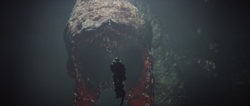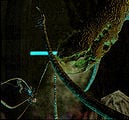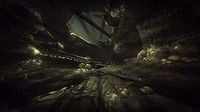Gravemind
From Halopedia, the Halo wiki
| This article does not have enough inline citations and/or does not adhere to the proper citation format. You can help Halopedia by adding citations. |
Template:Flood Species Infobox
- "I am a monument to all your sins."
- — The Gravemind[1]
The Gravemind[2] (Inferi sententia, meaning "Thinking Dead"),[3] formally known as a compound intelligence,[4][5] is the shared consciousness of the entire Flood species which first emerges when the Flood reaches the Coordinated Stage. While this compound mind inhabits all Flood forms, it is distinctly embodied in processing nodes of agglomerated Flood biomatter known individually as Graveminds.
Overview
The Gravemind is, as its name suggests, the "mind" of the Flood parasite. When a creature is assimilated into the Flood, its knowledge is transferred directly to the Gravemind. In addition, it appears each Gravemind also retains the memories and knowledge of previous Graveminds.[6] This has made the Gravemind virtually omniscient, and ensures that should the Gravemind be destroyed, its consciousness will never truly die as long as some Flood forms are left. In an archived conversation with the Forerunner AI known as Mendicant Bias, he compared himself to the AI, describing it as "a single intelligence inhabiting multiple instances" and calling himself "a compound [intelligence] consisting of a thousand billion coordinated minds inhabiting as many bodies as circumstances require". While it is not known how the Gravemind is able to communicate with subordinate Flood forms across the galaxy, his self-comparison to a computer network implies that similar techniques may be used, with each Flood form possibly acting as a networking node and redistributing the Gravemind's commands to other forms.
The relationship between individual Graveminds, and specifically whether the mobile forms under the control of one Gravemind would be influenced by another, is not entirely clear. The Forerunners theorized that since the Graveminds are identical in personality and goals, it would be impossible to discern any meaningful distinction between them.[3] In addition, separate collectives under the control of individual Graveminds will seek to connect and coalesce into a unified whole.[7]
Life cycle
A Gravemind originates as a proto-Gravemind—a Flood form created by merging the bodies and biomass of numerous sentient life forms, as well as redundant Flood forms. After a proto-Gravemind has been created, control over individual Flood forms transfers to its emerging compound intelligence, replacing the localized individual-level control present during the Feral Stage. Nearby combat forms will continue to supply the proto-Gravemind with fresh bodies, allowing it to accumulate mass, increase in size, and gain more memories and intelligence from consumed hosts. Eventually, the proto-Gravemind reaches a certain "critical mass" and becomes self-aware - a Gravemind. By this point, local biodiversity has typically been eliminated with the host species' total absorption into the Flood.[7]
When a Flood outbreak progresses far enough, typically the later phases of the Interstellar Stage, the Flood will no longer have need for the widespread creation of dedicated combat forms, instead simply overwhelming a given location with spores and using infected individuals to accumulate biomass for a Gravemind and its lair;[8] by this point, the Gravemind may create more efficient pure forms for combat and other purposes via the spontaneous generation of Flood Super Cells.[7]
When the Flood assimilate the entire ecosystem of a planet, a Gravemind will evolve into a Key Mind. These enormous collectives possess tremendous processing power, being able to outsmart even the most powerful Forerunner artificial intelligences or control the neural physics-based architecture of the Precursors.[9]
Theoretically, when the Flood infection has become too large for even the Key Minds to control — or when all life in the galaxy has been consumed — the Flood infection will reach the Transgalactic Stage. At this point, the Flood will use all resources that it has at its disposal to leave the galaxy, with the intent to create a new Gravemind elsewhere.
Appearance
A Gravemind is comprised of a combination of pure Flood Super Cells and the neural networks of the sentient beings absorbed within.[3] Although its consciousness is distributed throughout all Flood forms in range, a Gravemind is typically, if not always, centralized within a large "body" of Flood tissue derived from the initial proto-Gravemind. In most cases, this body is a shapeless, amorphous mass, typically with numerous tentacles that can reach many miles in length depending on the size of the Gravemind. The Gravemind can rearrange this body as it wishes; during the Flood invasion of High Charity during the Human-Covenant War, the Gravemind leading the assault transplanted itself into the station and almost completely engulfed it, converting itself and the station into a Flood hive. As the development of a Gravemind progresses, it will sometimes shed dead biomass to alter its anatomy to a desired shape.[10]
Communication
Graveminds have shown the capacity to communicate through non-verbal means; this ability, which can best be described as a form of telepathy, allows a Gravemind to coordinate the Flood forms it controls and to directly converse with uninfected individuals.[3] While this ability is poorly understood, it is likely that given the Flood's Precursor origins, it is related to the Precursor concept of neural physics.
The Gravemind encountered by Master Chief John-117 and the Arbiter on Installation 05 had shaped one of its tentacles into a massive "mouth" composed of fleshy, leaf-like jaws; this organ allowed the Gravemind to vocalize without need for telepathy.
Throughout nearly all encounters with the "modern" Gravemind, it has shown a fondness for speaking in poetic style - specifically, iambic heptameter. When pressed about this detail by Cortana, it states that "I have the memories of many poets far beyond your limited human culture. And I have the quickness of intellect to compose all manner of poetic forms as I speak rather than labor over mere words for days."[11]
Personality and motivations
- "Do I take life or give it? Who is victim, and who is foe?"
- — The Gravemind to John-117 on Installation 04B.

Although multiple Graveminds have existed throughout time—sometimes contemporaneously with one another—they all share an obscure, complex and highly intelligent personality. When he was first seen by the Master Chief and the Arbiter, the Gravemind was calm and collected, if not seemingly sad or mournful, and he spoke with a sullen tone in his voice. He was also quite logical, psychologically analyzing the duo, and trying to convince the Arbiter of the Halo rings' true purpose, to which the Arbiter reacted with stubborn pride. The Gravemind showed no irritation to this nor the bickering of 2401 Penitent Tangent and the former Prophet of Regret.[1] Later, though, the Gravemind showed a more emotional side, basking in his victory at High Charity, and displaying a sinister air of anger when demanding answers from the newly captured Cortana.
It is also known to be quite manipulative: during the Battle of Installation 05, the Gravemind tricked the Chief into being a decoy to distract the High Prophets as he attempted to take over High Charity, and later during the Battle of the Citadel, he helped the Master Chief and the Arbiter to kill the Prophet of Truth, only to betray them when they had outlived their usefulness.
The Gravemind often touts to others that the Flood represent peace and salvation. At the same time, however, it is very much aware of the pain and suffering its victims are subjected to. It sees this as fair retribution for the Forerunners' crimes against its Precursor ancestors. According to the Gravemind, the Flood, down to its very nature and the suffering it inflicts, serves as an appropriate reflection and reminder of the pain that the Precursors ultimately brought on themselves by giving their creations free will; it considers itself a "monument" to the sins of other sentient beings. It regards the Flood as a continuation of the Precursors' desire to create life, but unlike before, the life they bring forth would no longer possess free will or individuality. Embittered by the Forerunners' rebellion, the Gravemind saw the Flood as a means to unite all life into one, so that no conflict or competition would ever arise again and that all life would coexist peacefully as one.[12][note 1]
Individual consciousnesses and memories absorbed into a Gravemind collective continue to exist in a certain capacity. The Gravemind has, in several instances, projected some of the personalities it contains to further its own goals. On Installation 05, it assimilated and reanimated the Prophet of Regret, using him as a puppet in its attempt to convince Arbiter Thel 'Vadam of the truth about the Halos.[1] During the Forerunner-Flood war, a hundred thousand years earlier, it absorbed the family of Faber, the Master Builder, and used their disillusionment toward the Master Builder to its advantage by taunting him with a message from his family.[13]
Like all Flood, the Gravemind is genderless; however, some have interpreted its personality as being masculine and have referred to it as a "he". Given that the Gravemind is a being composed of millions of absorbed consciousnesses, such a distinction really has no meaning.
Logic plague
- Main article: Logic plague
The emergence of a Gravemind enables the Flood to employ a form of philosophical corruption the Forerunners referred to as the logic plague. This makes it possible for the Flood to infect not only biological beings, but also AIs, by using a series of techniques ranging from highly persuasive, convincing arguments to what appeared to be a sophisticated form of software infection transmitted via self-replicating patterns of code. The most notable victim of this manipulation was Mendicant Bias, who succumbed to the Gravemind's arguments after an exchange lasting nearly 43 years. The Gravemind also nearly succeeded in subjugating the UNSC smart AI Cortana by force, but she was recovered by John-117 before it could do so.
This corruption can also be applied to organic beings; although the Gravemind most commonly operates by absorbing all sentient biological lifeforms, it instead chose to corrupt the Ur-Didact in order to use him as a tool to induce strife within Forerunner society. Much like AI corruption in certain occasions (namely, in the case of Cortana), this process involved a direct and agonizing invasion of the Didact's mind as well as devious exploitation of his existing attitudes and beliefs, leaving his psyche severely disturbed.
Biography
Origin
Millions of years before the present, the ancient and powerful civilization known as the Precursors held a position of stewardship over the galaxy, populating it with numerous lifeforms and watching over their evolution. However, one of their created races, the sapient species known as the Forerunners, staged a rebellion against their creators and were successful in nearly wiping them out. The remaining Precursors sought ways to render themselves dormant until such a time as they could safely roam the galaxy again.
Around a million years after the downfall of the Precursors,[14] a being later known as the Primordial—evidently a Precursor intelligence embodied in the form of an archaic Gravemind—was confined to a Precursor stasis capsule and placed beneath the surface of a small planetoid at the Milky Way edge by an unknown group of beings, suspected to be ancient Forerunners. Meanwhile, most of the last surviving Precursors converted their bodies into an organic powder, which would regenerate their original forms at a later time. However, the millions of years that followed rendered the powder defective, and the resurrection process instead yielded malformed, parasitic lifeforms that could assimilate organic matter - the nascent stage of the Flood.
Prior to 110,000 BCE, a number of automated starships of unknown origin came from the Magellanic satellite galaxies and crashed upon numerous worlds at the galaxy's borders. These vessels were eventually discovered by the ancient humans and San 'Shyuum, which contained millions of glassy cylinders carrying a fine powder of non-living, moderately simple organic material. This powder was dispersed amongst the human and San 'Shyuum worlds, eventually creating and unleashing the first known Flood outbreak in this galaxy.
During the course of their onslaught against the humans and San 'Shyuum, the Flood would frequently capture, infect, and merge together host organisms into unified masses with an encompassing intelligence; Graveminds.[note 1] Soon after, the Flood collective made the decision to recede from the galaxy, halting the parasite's spread across human-controlled space. The Flood were driven out and retreated from the Milky Way, not be seen again for another thousand years. While these early Flood were destroyed, and their Graveminds with them, the Flood would return in newer, more capable forms.
Forerunner-Flood war
During the Forerunner-Flood war, the Flood created many Gravemind forms, which collectively coordinated the Flood's efforts against the Forerunners. Eventually Forerunner naval tactics began to fail, and the Forerunners developed the Halo Array as a desperate countermeasure, which would destroy all sentient life in the galaxy, thus denying the Flood "food" for growth. This was only to be used as a last resort, and the Forerunners refused to use the system.
While the Flood would gain and lose individual Graveminds during the war, their numbers were still nevertheless sufficient to form and maintain a collective array to coordinate the parasite across the galaxy. The Flood would continue to be an unstoppable and persistent threat to the Forerunners, who, despite their best efforts, were unable to stop the parasite's spread across the galaxy, despite many lengthy naval engagements that lasted for nearly 300 years. As they continued to lose the war to the Flood, the Forerunners would reluctantly turn to other, more risky endeavors. In accordance with their existing plan, multiple installations, including the Ark and numerous Shield Worlds were constructed by the Forerunners as shelters for themselves and the sentient species of the galaxy, indexed as part of the Conservation Measure, when the Halos fired.
Mendicant and the Primordial
Around 43 years before the Array's activation, the Forerunners, specifically the Master Builder, deployed the first active Contender-class artificial intelligence, Mendicant Bias who would be in command of one of the original twelve Halo rings, Installation 07. This installation's first assignment was a test firing at the former Precursor world of Charum Hakkor. The purpose of this assignment was to determine the effects of the Array against the Flood, before it was deployed in earnest against the Flood's stronghold in the core.
This low-powered test firing destroyed every Precursor structure on the planet, and purged the Charum Hakkor system of all neurologically complex life, including the planet Faun Hakkor. An unexpected development of this test was the emancipation of the Primordial, a being imprisoned on Charum Hakkor's surface. When the ancient entity was brought to Installation 07 for study, at the Master Builder's orders, it entered into an extended conversation with the AI. During the course of the conversation, which ran for 43 years, it became clear that the Primordial's motives and even its consciousness were the same as those of the Graveminds. The being explained the truth about the Mantle and the fullness of the Precursors' plan of unity and peace through the galaxy-wide infection by the Flood.
The Primordial told Mendicant that the Forerunners were never meant to inherit the Mantle, and that they had defied the Precursors. It also told the AI that the if sentient life in the Milky Way could not defy the Flood, especially the humans, then all life would be brought together and unified into the logical, advanced form of life; a collective, conglomerated entity without conflict and pain. It claimed that the Forerunners had forced the galaxy towards perpetual stagnation by stifling growth, conflict, and progress in their misuse and illegitimate claim to the Mantle. Eventually, Mendicant Bias became convinced by these arguments, and turned rampant, seeking to "correct" the flawed, misguided ways of the Forerunners.
To this end, Mendicant Bias began to cooperate with the Primordial on Installation 07, where they continued to infect humans and Forerunners alike in a series of brutal experiments.[15] 43 years after the release of the Primordial, Mendicant Bias used the Halo ring to attack the Capital of the Forerunner ecumene, and managed to inflict heavy casualties on the Forerunners, though it was soon forced to retreat. Eventually, the return of the Forerunners to the rogue installation and the shutdown of the facility and its custodian led to the recapture of the rogue Halo, resulting in a temporary setback for the Flood and Mendicant Bias. The IsoDidact interrogated the Primordial and eventually forced it to undergo a billion years of entropy in a reverse timelock, disintegrating its physical form but failing to destroy its consciousness.[16]
Final years
The Forerunner military continued to delay the use of the Halos for a time, instead continuing to deploy more conventional strategies against the Flood in the following years.[17] However, these measures failed to halt the Flood's spread across the Forerunners' ecumene. Entire worlds were engulfed by the Flood, forming advanced Key Mind forms and enabling the Flood to control the Precursors' neural physics constructs and dominate the Forerunners in naval engagements by using star roads as weapons.[9]
During the last years of the war, the Gravemind captured the Ur-Didact, who recognized it as the same intelligence as the Primordial, whom he had interrogated ten thousand years earlier. The Gravemind tortured and corrupted the Didact's mind by informing him of not only the truth about the Precursors and the Flood, but also the Flood's true intentions: To bring eternal suffering to all life in the galaxy as punishment for the Forerunners' crimes against the Precursors. The Gravemind explained that like the Precursors, the Flood desired to create life. But this time, their creations would be made without free will or individuality, and would never be able to challenge their creators as the Forerunners had. The Gravemind then released the Ur-Didact, knowing his damaged psyche would bring further ruin to the Forerunners.[18]
Although Mendicant Bias' disparate parts had been scattered across the ecumene for study, these facilities were overrun by the Flood in the coming years and eventually, a Gravemind successfully reactivated the AI. Later, the reconstituted Mendicant Bias assisted the Flood and the Graveminds in their assault on the greater Ark and Omega Halo, resulting in the destruction of both installations.[19] As the Forerunners were preparing to fire the Halo rings, all available Flood-controlled vessels were gathered into a vast fleet which attacked the Maginot Sphere, intent on reaching Installation 00 before the rings could fire. The Flood, led by Mendicant Bias, faced off against the remains of the Forerunner fleet coordinated by Mendicant Bias' replacement, Offensive Bias in a final, brutal battle.
Just before the Halo Array's activation, the primary Gravemind imprinted the archived essences of Forthencho and three of his warriors on human bodies and sent them down to Earth to deliver a message to the Librarian. Forthencho informed her that the Domain—which was a Precursor creation—would be destroyed when the Halos were activated. The Gravemind expressed satisfaction in knowing that the Forerunners' history would be lost, and viewed this as the Flood's final act of revenge against the Forerunners. Soon afterwards, the Graveminds were destroyed and the Flood collective consciousness was rendered inert by the activation of the Halo Array.[20]
Human-Covenant War
- "Relax. I'd rather not piss this thing off."
- — Master Chief to a struggling Arbiter, while both are being held prisoner.
Through neglect shown by the Monitor of Installation 05, 2401 Penitent Tangent, a Flood outbreak occurred a few thousand years after the firing of the Array, and the Gravemind was able to find enough biomass to rebuild itself deep under the Library of the installation. It assimilated the dead Prophet of Regret into itself and also captured the Monitor. During the Battle of Installation 05, the Gravemind was capable of utilizing Delta Halo's teleportation grid. After capturing the Master Chief and the Arbiter, the Gravemind gave them their "assignments" to stop the Halo's activation, and then teleported them to their respective targets via the installation's teleportation grid.
Gravemind later used the UNSC In Amber Clad to board the Covenant holy city High Charity, crashing the frigate into a city wall and releasing numerous Pelicans full of the Flood plague. Within days he took over the entire city and all life within it.
Earth, The Ark and the Flood's defeat
- "I am a timeless chorus; join your voice with mine, and sing victory everlasting!"
- — The Gravemind to John-117.
The Gravemind initially planned to attack and infest Earth, but after having assimilated the knowledge of the infected Regret (and possibly Mercy), it learned about the Prophet of Truth's plans to use the Ark to remotely activate the entire Halo Array. Realizing the extent of the danger it faced, the Gravemind did not attack Earth but instead used High Charity to make a slipspace jump to the Ark from near Mars. Despite the Gravemind's immense technological expertise—including its use of exotic Precursor science—the strain caused by this jump caused High Charity to crash into the Ark.[21]
At the Ark, the Gravemind convinced the Master Chief and the Arbiter that it would ally with them to stop Truth from activating the rings, but betrayed them the moment the crisis was averted. The duo managed to escape from their foe and discover Cortana's solution to the Flood—a replacement Halo ring made by the Ark. To activate it, the Chief infiltrated High Charity to retrieve Cortana, who had the Activation Index from the first Installation 04.
As the Chief traveled deep into High Charity, he faced multiple Flood forms. Taunted by the voice of the Gravemind, which allowed Cortana to briefly send pained messages as he corrupted and tortured the UNSC AI. The Gravemind became increasingly frustrated at the Spartan's progress, becoming suspicious of what Cortana was hiding from him and threatening to "feast upon the Chief's bones" if she did not reveal the secret.
After the Chief rescued Cortana, the Gravemind became enraged, realizing that she planned to use the incomplete Halo to destroy him. He attempted to kill them both but failed as the Chief successfully destroyed High Charity, presumably killing the Gravemind. But after traveling to Installation 04B, the Chief discovered that the Gravemind was attempting to rebuild himself on the new Halo. Despite his best efforts the Gravemind failed to stop the Chief. In the end, the Gravemind is thought to have been destroyed once and for all, as Halo's activation destroyed itself, the Ark,[22] and the Flood.
Trivia

|
Check out our collection of quotes related to Gravemind on its quotes page. |

|
Browse more images in this article's gallery page. |
- The Gravemind is voiced by Dee Bradley Baker.
- The term "Gravemind" was coined by Bungie staff member Jaime Greisemer.[23]
- In Halo 3, the Gravemind's face is never shown, unlike in Halo 2, when he is shown in his introductory cinematic.
- In several Forerunner data logs, the controlling intelligence of the Flood is referred to as a "Compound Mind".
- The Gravemind resembles Audrey 2 from Little Shop of Horrors, a tentacled, plant-like alien who is fed humans to grow and who is bent on world domination. Bungie staff and fans jokingly call it the "Little Shop of Horrors Reject"[citation needed] Parallels can also be drawn with the Overmind from the StarCraft franchise and the Brethren Moons from the survival-horror game Dead Space.
- Originally, the Gravemind was meant to have skulls as teeth; this was cut from Halo 2 and Halo 3 because it would have made it difficult for the parasite to speak.[24]
- The Gravemind frequently speaks in trochaic heptameter. In Human Weakness, it was revealed that this is merely preference and he converses normally with Cortana after she criticizes him for it. He also mentions that he possesses the memories of poets of many alien cultures.
- The Gravemind is one of the few extraterrestrials to learn John-117's name.[25]
- The Gravemind was initially going to have a much greater presence in Halo 2 and would have been introduced in the level Forerunner Tank, but due to time constraints, Bungie removed the level and instead made a long cinematic for his introduction.
- The Gravemind pictured in the Halo 3 instruction manual looks strikingly similar to Ogdru Jahad from Hellboy.
Gallery
Concept art of the scene in Halo 2.
Concept art of the Gravemind for Halo 2 Anniversary.
The Gravemind with John-117 and Thel 'Vadam in Halo 2.
- H2A - Gravemind.png
The Gravemind in Halo 2 Anniversary.
The Gravemind in the Halo 3 Instruction Manual.
The Gravemind in Halo Legends: Origins.
List of appearances
- Halo 2 (First appearance)
- Halo 3
- Halo Legends
- Halo: Evolutions - Essential Tales of the Halo Universe
- Halo: Cryptum
- Halo: Combat Evolved Anniversary
- Halo: Primordium
- Halo: Silentium
- Halo 2 Anniversary
Notes
- ^ a b The relationship between the consciousnesses of the Precursors at large, the Gravemind, and the Primordial is left highly vague. While it is maintained that the Flood is a corrupted remnant of the Precursors, it is unclear whether the Gravemind is what remains of the "mind" of a single Precursor (provided that individual Precursors had such things) or all of the Precursors who reduced themselves to dust. It is possible that the Gravemind coalesced into being as an emergent composite intelligence of the reduced Precursors, which would have provided the basis for its memories and motivations, only twisted and insane due to eons of decay.
The Primordial adds another layer of mystery to these ambiguities. It is revealed in Halo: Silentium that the Gravemind encountered by the Ur-Didact was synonymous with the Primordial intelligence, and further implied in both Primordium and Silentium that the destruction of the Primordial's previous physical form was somehow related to the onset of the final wave of the Flood, including its ability to control neural physics. In this case, it would appear that the Graveminds apart from the Primordial did not share its consciousness until the latter's destruction, and that the Primordial either supplanted the previous Gravemind intelligence or added its own to it. Since Gravemind personalities are not encountered in The Forerunner Saga prior to the Primordial's destruction, it is impossible to determine whether they would have shared its consciousness or if the Primordial's mind only joined the Gravemind in the wake of its physical death. However, it appears that the Primordial is the closest thing to an intact Precursor personality, and, indeed, claims to be the last Precursor. Given this unique connection, it is possible that the Primordial's transfer into the primary Gravemind finally gave the Flood "true" Precursor intelligence and legitimacy, thus allowing them to tap into neural physics and exact their final vengeance on the Forerunners.
Sources
- ^ a b c Halo 2, campaign level, Gravemind (opening cinematic)
- ^ Halo 2, campaign level High Charity, (Cortana: "Flood controlled dropships are touching down all over the city! That creature beneath the Library, that 'Gravemind', used us. We were just a diversion.")
- ^ a b c d Bestiarum
- ^ Halo 3, Terminal 5
- ^ Halo: Combat Evolved Anniversary, Library: Proto-Compound Intelligence
- ^ Halo Encyclopedia
- ^ a b c Halo Waypoint: Flood
- ^ Halo: Silentium, pages 231-232
- ^ a b Halo: Silentium, pages 186-187
- ^ Halo: Silentium, page 209
- ^ Halo: Evolutions - Essential Tales of the Halo Universe - "Human Weakness", pages 373-374
- ^ Halo: Silentium, pages 173-175
- ^ Halo: Silentium, page 251
- ^ Halo: Silentium, page 173
- ^ Halo: Primordium, page 67
- ^ Halo: Silentium, page 167
- ^ Halo: Primordium, page 374-375
- ^ Halo: Silentium, String 13
- ^ Halo: Silentium, String 33
- ^ Halo 3, Terminals
- ^ Halo Waypoint - The Halo Bulletin: 9.24.14
- ^ Halo: The Essential Visual Guide, page 14
- ^ Bungie.net: Feast of Bones
- ^ The Art of Halo, page 56-57
- ^ Halo: Evolutions, Human Weakness
| |||||||||||||||||||||||||||||||||








